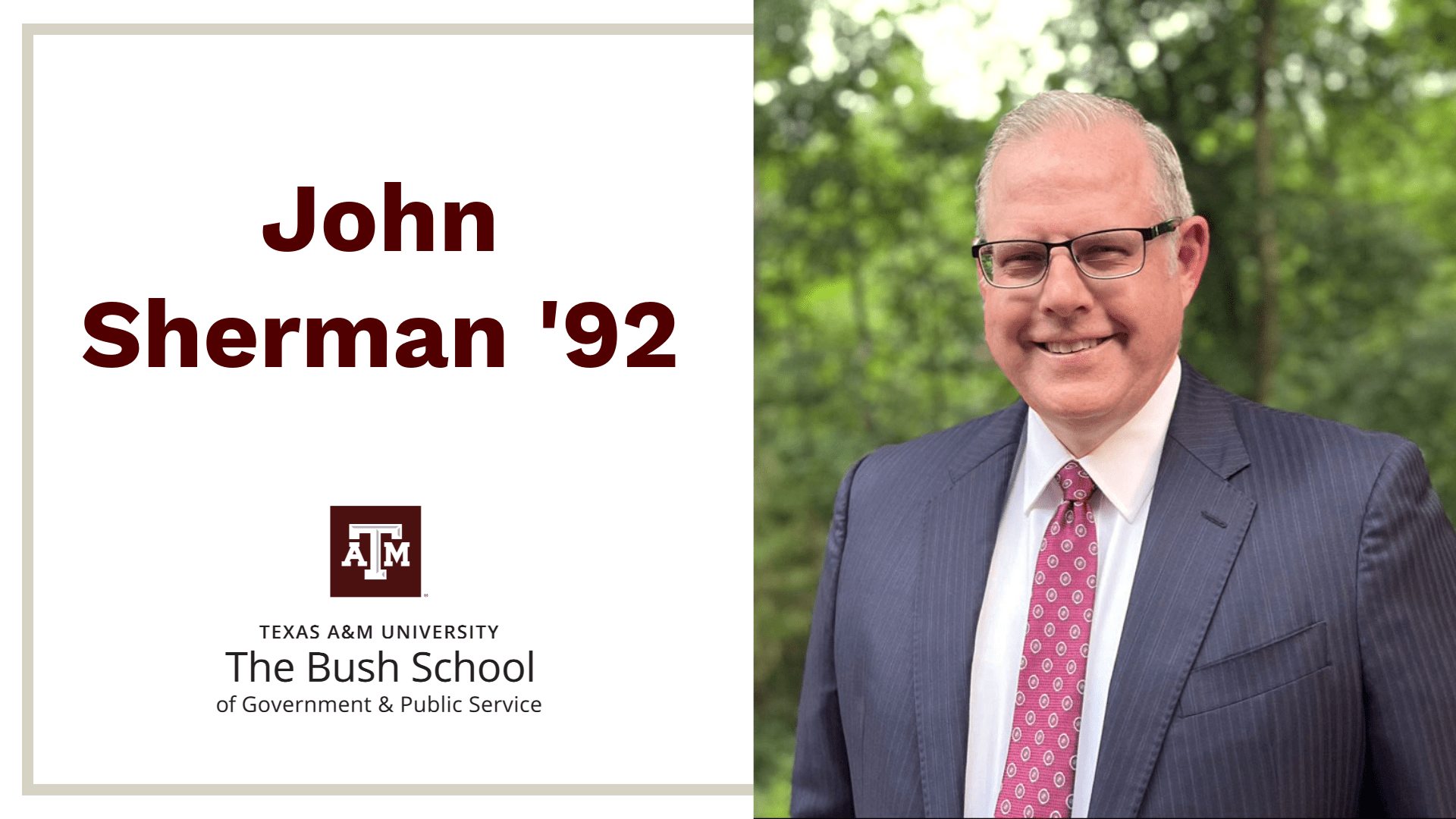
GovCIO Media and Research interviewed John Sherman, who served twice as a presidentially appointed technology chief during a three-decade career in national security
John Sherman ’92 was a political appointee for two presidential administrations, serving as technology chief for the U.S. intelligence community and then the U.S. military, prior to becoming dean of The Bush School of Government and Public Service on Aug. 1. GovCIO Media and Research recently sought his insight on a number of technology and personnel-management topics, including:
- Whether to loosen regulations on artificial intelligence, as the Trump administration has proposed.
“I think this is, personally, the right move here,” Sherman said. He said the most analogous situation might be the U.S. airline industry in the 1920s and ‘30s: no longer nascent, ready for reduced dependence on government, but still in need of regulation. “Not (being effective) is another big concern I have, beyond the Skynet worries or what have you. I want A.I. that is used by our warfighters to be reliable.
“You can’t take your hand off the bicycle seat too much, but you also don’t want to be running alongside the bike indefinitely.” - How the administration can leverage technology to achieve its defense priorities, such as the “iron dome” aerial-threat defense system. Sherman said a key element of the initiative will be the availability of spectrum bandwidth for military purposes, particularly the lower three gigahertz. Previous administrations have weighed the military’s need for communication bandwidth – essential as fighting forces incorporate increasingly advanced and interconnected technologies – against the push of businesses eager to open up that bandwidth for commercial use.
“I get the need to balance our economic interests with our military interests,” Sherman said. “We need to create opportunities for U.S. companies to dominate the 5G and next-G space. But if we’re going to be protecting – and we should – the continental United States, as well as Alaska, Hawaii and our territories, we’re going to have to be able to leverage spectrum. … It’s a very finite amount of spectrum that we have.” - Whether CIOs in the defense and intelligence fields should be political appointees, concerned first and foremost with carrying out the policies of a presidential administration, or career civil servants expected to remain apolitical. Sherman said the Trump administration’s push to make IT positions political appointees holds merit, particularly at the highest levels of government. Officials at the department and agency level often make decisions that go beyond efficient management and best practices and into the realm of government policymaking.
But Sherman cautioned that below the top levels of government are organizations that, often out of necessity, have developed processes that could confound someone not familiar with them. Sherman cited his own time at the National Geospatial-Intelligence Agency, which employs a mix of modern and antiquated IT systems. A political appointee might not understand the intricacies of such a system and that lack of familiarity could create issues for the organization.
“Parachuting a political appointee in there who is not familiar with the mission … (and does not possess an) understanding of all the piping and some of the history, I think this is where you get into some problems.” - What modernization initiatives will probably be prioritized. Sherman said he expects cybersecurity to be among the foremost priorities.
“I think they’re going to keep up the full-court press on that front,” Sherman said. “Global adversaries, nonstate actors and others are going to continue to threaten the United States, business here, private citizens, whether it’s ransomware, whether it’s cyberattacks, any number of threat vectors.” - How far the administration should take its ongoing effort, led by the Department of Government Efficiency and its leader, tech mogul Elon Musk, to shrink the federal workforce. Sherman said the administration should pay particular attention to probationary workers – those who have been in federal employ for less than a year – and their contributions.
“I understand what they’re doing on the personnel front,” Sherman said. “It’s tough, in many regards, but my respectful plea to the administration is: on the new hires and probationary period folks, these are your innovators coming in, the driven individuals who have aspired to work at these agencies and organizations. Those are the ones who are going to perhaps innovate the most, work the hardest and the latest sometimes, and be willing to go to the most dangerous places.
“And I mean this with the utmost respect to the administration, but please, let’s not eat our seed corn here. … I’m convinced those individuals (who) are at the front end of their careers are the ones who are going to give us our superpowers against the (People’s Republic of China) and other potential adversaries.”
